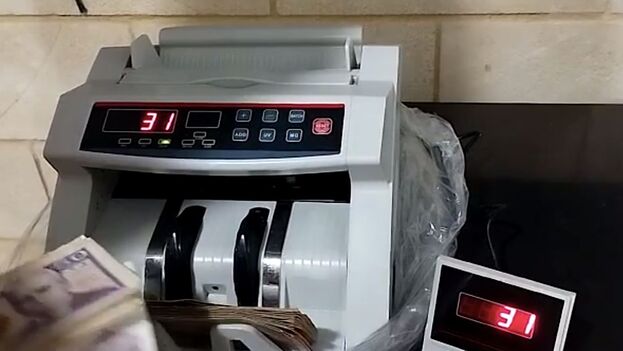
![]() 14ymedio, Havana, March 10, 2023 — Pablo, a Mexican businessman with an invitation to the Cuban Habano Cigar Festival, got more than he bargained for during his first trip to the island. Ready to enjoy a luxurious, weeklong vacation, Creole cuisine and the world’s best cigars, he boarded the plane with more than 2,000 dollars stashed in his wallet. Upon arriving in Havana, he headed to the airport’s currency exchange office, handed over all his cash, and got back wads and wads of Cuban pesos. His pockets are still feeling the pain.
14ymedio, Havana, March 10, 2023 — Pablo, a Mexican businessman with an invitation to the Cuban Habano Cigar Festival, got more than he bargained for during his first trip to the island. Ready to enjoy a luxurious, weeklong vacation, Creole cuisine and the world’s best cigars, he boarded the plane with more than 2,000 dollars stashed in his wallet. Upon arriving in Havana, he headed to the airport’s currency exchange office, handed over all his cash, and got back wads and wads of Cuban pesos. His pockets are still feeling the pain.
“I needed a bag to carry it all,” he tells 14ymedio, still exhausted from his Cuban adventure. Pablo flew to the island with three friends and checked into a hostel at which he had, fortunately, already made a reservation.
Famished, they set out in search of a privately owned restaurant in Old Havana. What they found was a disconnect between the “mountain of cash” they had been given at the airport and the restaurant’s shockingly high prices. “When I took out a wad of bills to pay the tab,” he recalls, “the waiter raised his eyebrows and came back with a counting machine.”
To the Mexican tourists’ surprise, money counting machines have become increasingly common in Cuba. “There are lots of them for sale,” the hostel’s owner told them upon their return.
Rising prices combined with a falling peso and a shortage of large denomination bills have contributed to the rising popularity of these machines, which are listed for sale on the island’s online classified ad sites.
“Bill counting machine for 260 dollars, with ultraviolet counterfeit detector,” reads one futurist-sounding ad. “Brand-new machine, still in the box. Be the first to use it,” reads another, which is accompanied by a video.
Its spinning wheels emit a clear, efficient sound as the faces of Calixto Garcia or Carlos Manuel de Cespedes zip through the the mechanical counter and a digital screen displays the total. “It never fails,” claims one ad.
Other, more sophisticated sellers do not focus on the price but look for the most flattering angles from which to photograph the device. A counter in its original box, with shiny “teeth” and new buttons, costs more than one that has been recycled, or surreptitiously removed from a bank. Every transaction in Cuba requires a large amount of cash, another consequence of the infrequent use of credit cards and other forms of virtual payments. “I bought eight of the big machines and didn’t pay more than $200 apiece,” admits one wealthy private business owner.
Inflation has dashed the dreams of tourists like Pablo, who thought he could have a luxurious vacation for a reasonable price but had to settle for the low-cost version. He and his friends did manage to buy a few cigars at the Habano Festival but, by the time they got there, he was already disgusted and in a bad mood.
“I thought it had a very elitist air,” he says, remembering how officials, dressed in suits or guayaberas, strutted through the convention center with thick cigars in their mouths, accompanied by their bodyguards.
“Worst of all was the closing night event. President Díaz-Canel and other government officials were there, all dressed up,” he says. The climax came when it was it was time to auction the humidors, the cedar boxes used for storing the cigars. One had been signed by the president, for which one buyer paid a whopping 4.2 million dollars. “Or so they said,” adds a dubious Pablo, who found something strange about the transaction, wondering whether the Chinese or Russian millionaire who bought the piece even existed. “It had to be another ruse,” he figured, chastened by his experience at the airport.
He returned to Mexico disheartened, unable to get the sound of the counting machines he heard in every restaurant out of his head. “My friends and I decided we’d try to trade the cigars we bought for non-Cuban ones,” he says. “It won’t be easy but the whole experience left us disgusted. Like the song says, I won’t be going back.”
____________
COLLABORATE WITH OUR WORK: The 14ymedio team is committed to practicing serious journalism that reflects Cuba’s reality in all its depth. Thank you for joining us on this long journey. We invite you to continue supporting us by becoming a member of 14ymedio now. Together we can continue transforming journalism in Cuba.
